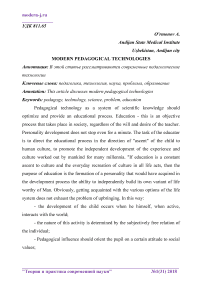Modern pedagogical technologies
Автор: Ormonov A.
Журнал: Теория и практика современной науки @modern-j
Рубрика: Основной раздел
Статья в выпуске: 1 (31), 2018 года.
Бесплатный доступ
This article discusses modern pedagogical technologies.
Pedagogy, technology, science, problem, education
Короткий адрес: https://sciup.org/140289430
IDR: 140289430
Текст научной статьи Modern pedagogical technologies
Pedagogical technology as a system of scientific knowledge should optimize and provide an educational process. Education - this is an objective process that takes place in society, regardless of the will and desire of the teacher. Personality development does not stop even for a minute. The task of the educator is to direct the educational process in the direction of "ascent" of the child to human culture, to promote the independent development of the experience and culture worked out by mankind for many millennia. "If education is a constant ascent to culture and the everyday recreation of culture in all life acts, then the purpose of education is the formation of a personality that would have acquired in the development process the ability to independently build its own variant of life worthy of Man. Obviously, getting acquainted with the various options of the life system does not exhaust the problem of upbringing. In this way:
-
- the development of the child occurs when he himself, when active, interacts with the world;
-
- the nature of this activity is determined by the subjectively free relation of the individual;
-
- Pedagogical influence should orient the pupil on a certain attitude to social values;
-
- the interaction of the teacher and the whole process of interaction with the child should be carried out at the level of modern culture and in accordance with the purpose of education.
The interaction of the teacher and students in the high meaning of this word implies something more than mutual influence on each other. To implement interaction, it is necessary for each other's interlocutors to accept each other as equal subjects of this communication, which in practice is not so common in the "teacher-student" system. The pedagogical influence, acting as a short moment of communication or prolonged influence, ensures the realization of functions in accordance with the educational purpose. In analyzing pedagogical influence, one should proceed from his appointment as the initial moment of interaction between the teacher and the student. In other words, the main purpose of pedagogical influence is to transfer the student to the position of a subject who is aware of his own life.
The realization of these functions of pedagogical influence is provided by pedagogical technology, which scientifically justifies the professional choice of the teacher's influence on the child in his interaction with the world, and shapes his attitude to this world. The essence of pedagogical technology is revealed through a system of necessary and sufficient elements, interconnected and having internal logic.
To determine the terms of pedagogical technology, it is necessary to answer a number of questions:
-
- what elements make pedagogical technology;
-
- what is their necessary and sufficient presence;
-
- in what relationship they are;
-
- what are the general and specific functions of each element.
Pedagogical communication, which focuses on the "discovery of the student in communication" through the creation of psychologically comfortable conditions for the disclosure of his personality. Pedagogical assessment that provides the functions of "imaging" at the level of social norms, stimulating activities and correcting deviations, is possible against the background of the implementation of the evaluation, not perceived by the student as an evaluation, but carried out by a hidden order.
The pedagogical requirement is another technological element. Through it, the subject ascends to the level of modern culture. Getting as a result of teaching to a social norm is his personality in behavior.
The next technological element is conflict. Conflict as any kind of contradiction between subjects requires the designation of these opposing views. At the same time, the teacher does not insist, but only offers a variant of attitude and behavior and raises the problem of choosing how to act in this situation.
Pedagogical conflict is resolved in the implementation of the functions of "removing mental stress."
In this system of pedagogical technology, a special place is occupied by such an element as pedagogical technique.
The pedagogical technique refracts the realization of all other elements, distorting or straightening, strengthening or weakening their influence. To implement each of these elements of pedagogical influence, which has its own specific functions, in practice not the entire possible set is used, but individual operations are selected that are specific for this teacher.
Thus, the formation of a child as a subject occurs with a positive reinforcement in his address, a statement of a hidden evaluation, with the unconditionedness of the required norm. Identified elements, with designated functions and certain operations, constitute the essence of pedagogical technology. However, the content of pedagogical technology is not limited to this: additional elements, such as psychological climate, group activity, pedagogical reaction to the act, are generalizing or private.


